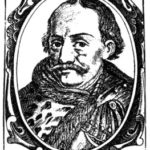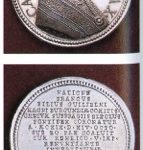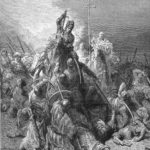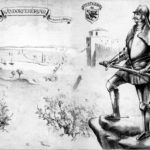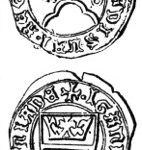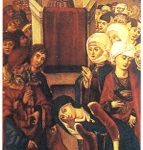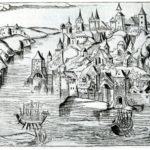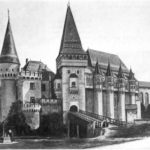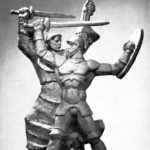János Hunyadi 1456
COMMEMORATIVE ADDRESS
János Hunyadi
By Christian M. Ravndal
Ladies and Gentlemen:
I was privileged some months ago to read an account of Cleveland’s epic history. I was taken back to a pioneer cabin at a fever-wracked river and led proudly through some 160 years to the present world metropolis. I heard the crescendo of a welling hymn of praise as you discovered and revealed God’s blessings. The Master’s melody was being played by an ever-growing orchestra, and the new members were quickly and with sure instinct learning to play their separate parts in harmony, though they were 46 different nationalities. What an inspiration in a divided world$
And you Magyars, you Magyars who have always been able to live in harmony with many nationalities; you Magyars who have the gift of diplomacy in your drive towards progress; you Magyars who have the gift of vision and perceive the oceans awaiting your genius; you Magyars who for a thousand years have helped build towards the unbounded; you Magyars who have figured prominently in Cleveland’s glorious epic.
As one follows the history of your forbears, one can trace a sublime will to survive amidst years of unequalled tribulations, years that witnessed all but a few of today’s world powers as yet unborn or rising only to fall again under a strain less than Hungary’s ordeal.
One can detect unquenchable patriotism in the remark of a traveling companion, “We gave the Turks and the Austrians indigestion and they had to throw us up again. And so will all others repent who try to gobble us up. They will find they swallowed a hornet’s nest.”
One finds abiding faith in the validity of the golden rule. In Hungary the Church the Magyars have held on to and fought for for centuries is still functioning in all its pristine glory. I have attended religious services in many countries. But never before going to Budapest had I seen the attendance God’s Church gets in that city. At each service, not only the pews, but the aisles and the corners are packed with people of all ages. Humility and steadfast hope through long suffering: these characterize the Hungarian people, just as they characterized János Hunyadi whose decisive victory of five centuries ago is now being commemorated throughout the civilized world. This great hero would never quit even when only a miracle would turn the tide… This great symbol of whom Arany wrote:
Aren’t you a happy spirit,
In grace and glory, to console us
As to the present, and give us
Hope as to the future?”
It is five hundred years since western civilization lost that great champion, the Magyar of whom his adversary Mohammed II said, “I mourn his death because the world has seen no greater man.”
Certainly John Hunyadi is one of the noblest figures in history. We know him from the learned Bishop Mihály Horváth as having been blameless in character, pious though not fanatical, just, magnanimous, not incited to revenge by personal injuries. As a citizen, he was characterized by a high sense of duty and a fiery patriotism; as a public servant, he stood for the law; as a statesman, he followed the path of justice and irreproachable righteousness; as a military man, he was, the Italian historian Bonfini said, the best general and the best soldier in one person.
What of this man who cleared the way for the Renaissance and enlightenment? What of this man who turned hopeless situations into triumph when, to use the words of Enea Silvio Piccolomini, later Pope Pius II, “Hungary is shaken, she has collapsed and is broken into parts and there is no connection between those parts”? What of this man, who opposed one of the greatest conquerors of history, the aggressor whose political creed was, “As there is only one God in heaven, there should also be only one master on earth”? What of this man who enabled the Hungarian chronicler Turóczi to write, “Mohammed, who wanted to rule the Universe alone, came amidst much noise of trumpets and drums, amidst great rejoicing, but left sadly and despicably in the quiet of night”?
Let us remember that the Turkish capture of Constantinople in 1453 shocked all Europe. Pope Nicholas V urged a crusade under Hungarian direction and Hunyadi came out of retirement to head the Christian armies. The Christian community’s spirit had long been dulled, however; and had made way for a new development that observed the interests of one national community alone. Hunyadi found that Hungary would have to carry most of the burden alone.
In 1456 Mohammed II launched a huge offensive against the heart of Europe with more than 150,000 well-trained men, 200 large ships, 300 cannon and many siege machines. On June 29, 1456, the Pope issued a Bulla Orationum ordering the bells to be rung in all churches at noon every day to awaken the Christian world to the mortal danger. But this admonition came too late to help Hunyadi. He had earlier lost faith in receiving foreign support and, though gravely handicapped by the intrigues of Cillei, had been able through the exercise of his miraculous gift of leadership, and the valiant aid of the Franciscan friar Giovanni de Capistrano – later canonized – to mobilize an army of some 40,000 volunteers, mostly peasants and craftsmen, around a hard core of mercenaries. What foreign aid arrived had also been of popular rather than feudal character. The 600 students of Vienna, the group of members of the Third Order, a lay organizations of the Franciscan friars, and a prior to the Pauline Order* with seven warlike friars will be remembered as characteristic instances of Hunyadi’s motley army. But these people had something unbeatable. They were exalted by patriotic and religious fervor and led by Hunyadi, the man who worked miracles.
The decisive battle began on July 4, 1456, when the Turks attacked Nándorfehérvár, the key fortress in Hungary’s defense system. Its commander was Mihály Szilágyi, Hunyadi’s gallant brother-in-law. Ten days later Hunyadi and Capistrano arrived on the scene and after five hours of fighting broke the Turkish blockade and merged forces with Szilágyi. On July 21 the Turks under the Sultan’s personal leadership stormed the fortress in successive waves. But they were beaten back and on the following day Hunyadi surprised and captured their artillery, turning what hadn’t been destroyed on the Turkish encampment. The army, which had set out to conquer, fled in the night.
All Europe rejoiced. Nándorfehérvár (today Belgrad) and with it the Balkans and Central and Eastern Europe were saved. Hungary’s independence was made secure for the next seven decades. The Renaissance and a period of enlightenment were ushered in – and that new era found one of its dominant figures in Hunyadi’s own son, King Mathias the Just.
Unfortunately, Hunyadi died shortly after his triumph. He fell victim to a plague on August 11, 1456, as did his faithful associate Capistrano on October 23. But memory of him lived on and memories are a mighty force.
I am reminded of what Louis Elekes wrote, “Every people, even the smallest, has its heroes, and every nation, if it is worthy of the name, has its memories. Perhaps it is this very gift of remembrance that consecrates a community of people and makes it into a nation. The common past is a common treasure, mutual joy and mutual suffering, sublimated into a memory, may build up the nation’s pride and its faith in the future.”
On his death bed Hunyadi left this advice: “Defend, my friends, Christendom and Hungary from all enemies, and follow my example in opposing the Pagan foe. Do not quarrel among yourselves. If you should waste your energies in altercations, you will seal your own fate as well as dig the grave of our country.”
The memory of this has lived on and has been consecrated into an ideal that pervades the nation’s entire personality. Today the Pagan foe is not the Turk. He and other Moslems are joining Christians in the formation of a worldwide united front of peoples who believe in one Almighty God.
In the poem “Szózat” the poet Vörösmarty drew the pathetic picture of a great day of burial when the nations of Europe would stand around the grave where the Hungarian nation had been entombed. I perceive no such fate for the Magyars. Great national misfortunes always light the flame of patriotism. Mohács, for example, strengthened the feeling of patriotism just as the Reformation increased religious fervor. The feeling of national unity moves the heart of the nation with the unconscious but mighty force of an universal instinct. The fire of the Turkish wars only served to make this element in the Hungarian character as strong as iron. The foe changes from time to time. But whether Tatar, Turk, Austrian, Nazi or anyone else the Magyar can be counted on to fight for God and Country just as he did in the Middle Ages.
My dear friends:
The central idea of American history is the struggle for human freedom. It is all the more natural that countless Hungarians have chosen this great, free country for their new homeland. And it is natural for the same reason that the American understands the significance of struggles such as Hunyadi’s was. It has been my good fortune to have an opportunity to acquaint myself directly with the Hungarian people, its past, its present, its hopes. I speak from the heart when I say:
On this free soil, I salute Hungary, bulwark of Christianity, home of heroes.
* Pauline Order is a Hungarian founded religious order
****
(The Commemorative Address was delivered by the Hon. Christian M. Ravndal, American Minister to Hungary, in the Magyar language on August 19th, 1956, at the Hungarian Day celebration sponsored by the United Hungarian Societies of Cleveland, Ohio, in connection with the 500th Anniversary of John Hunyadi’s victory at Nándorfehérvár /Belgrade/)

